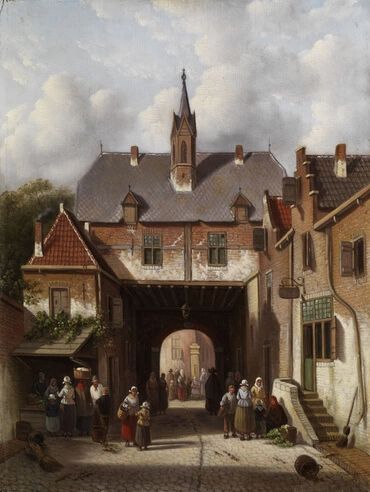Gate

Gates" in ancient times had a significance that does not hold in the modern world. Cities then were enclosed by walls for protection; gates in the walls let people in and out to do their business, but were also the weak points in the cities' defenses. In the Bible, cities on one level represent the minds of individual people. On a broader level, they represent beliefs shared by a community. The gates, then, represent openings where the Lord can feed us an understanding of truth and a desire for good. They also represent points where the hells can invade and sway us with false ideas and evil desires. We are kept in balance during our lifetimes, with influences from both the Lord and from hell. Ideally, we will over our lifetimes continue to invite the Lord farther and farther in and drive the hells back until ultimately the Lord can occupy our minds completely. And that point our belief in Him and His power and love will hold the gates and deny evil any entrance. As individuals, we at that point become angels. As communities, we at that point become part of the Lord's church. And at that point the gates become an entry point, introductory truths that allow people to enter churches and start bringing the Lord into their lives.
Arcana Coelestia # 3732
3732. 'Jacob made a vow, saying' means a state of Providence. This is clear from the meaning of 'making a vow' in the internal sense as wishing the Lord to provide; and therefore in the highest sense, in which the Lord is the subject, a state of Providence is meant. The reason why in the internal sense 'making a vow' means wishing the Lord to provide is that present within vows there is a desire and affection that what is wished for may come about, thus that the Lord may provide it. Within them something of a bargain is present, and at the same time on man's part something of a bounden duty to keep his side of it, should he obtain his desire. This was the case with Jacob, in that Jehovah was to be his God, and the stone which he placed as a pillar was to be God's house, and he would devote a tenth of everything He had given him, if Jehovah guarded him on the road, gave him bread to eat and clothing to wear, and he went back in peace to his father's house. From this it is evident that the vows made in those times were particular agreements, involving primarily men's acknowledgement of God as their God if He provided them with what they desired, and involving also their repayment to Him with some gift if He did provide it.
[2] That state of affairs shows quite clearly what the fathers of the Jewish nation were like. They were like Jacob here, who did not as yet acknowledge Jehovah and was still at the stage of choosing whether to acknowledge Him or some other as his own God. It was a special feature of that nation, even of their fathers, that everyone wished to have his own God; and anyone who worshipped Jehovah worshipped Him merely as some god called Jehovah, the name which distinguished Him from the gods of other nations. Accordingly their worship even in this respect was idolatrous, for the worship of the name only, even of Jehovah's, is nothing but idolatrous, 1094. This is like people who call themselves Christians and say that they worship Christ, but do not live according to His commandments. They worship Him in an idolatrous way since they worship only His name, it being a false Christ whom they worship; reference to that false Christ is made in Matthew 24:23-24 - see 3010.






